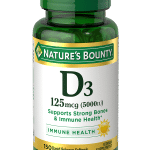delivery within 72 Hours
Nature’s Bounty D3-50mcg
₨ 3,994
Product Title: Nature’s Bounty D3-50mcg
Generic: Cholecalciferol
Pack Size: 150s
Product Form: Capsule
Delivery within: Delivery within 2 to 3 working days Across Pakistan
Shipping & Delivery
-
Courier delivery
Our courier will deliver to the specified address
2-3 Days
From Rs 250
-
Free 15-Day returns

Black Friday Blowout!
Description
Nature’s Bounty D3-50mcg is a dietary supplement containing Cholecalciferol, also known as vitamin D3. This supplement is designed to provide a convenient way to support overall health and well-being, particularly for individuals with limited sun exposure or inadequate dietary intake of vitamin D. Vitamin D3 is essential for various physiological functions in the body, including bone health, immune system support, and calcium absorption.
Uses:
- Bone Health: Vitamin D3 plays a crucial role in calcium absorption and bone mineralization, contributing to the maintenance of strong and healthy bones. Adequate vitamin D levels are essential for preventing conditions such as osteoporosis and rickets.
- Immune Support: Vitamin D3 is involved in modulating immune responses and may help support a healthy immune system. Adequate vitamin D levels have been associated with a reduced risk of infections and autoimmune diseases.
- Muscle Function: Vitamin D3 plays a role in muscle function and may help improve muscle strength and balance, particularly in older adults.
- Mood Regulation: Some research suggests that vitamin D3 may play a role in mood regulation and may help alleviate symptoms of depression and seasonal affective disorder (SAD).
- Cardiovascular Health: Adequate vitamin D levels have been associated with a lower risk of cardiovascular diseases, including hypertension, heart disease, and stroke.
Mechanism of Action:
- Calcium Absorption: Vitamin D3 enhances calcium absorption in the intestines, ensuring adequate calcium levels for bone health and other physiological functions.
- Bone Remodeling: Vitamin D3 regulates bone remodeling by stimulating osteoblast activity (bone formation) and inhibiting osteoclast activity (bone resorption), thereby maintaining bone density and strength.
- Immune Modulation: Vitamin D3 modulates immune responses by influencing the function of immune cells such as T cells, B cells, and macrophages. It may help regulate inflammatory processes and enhance antimicrobial defenses.
- Muscle Function: Vitamin D3 receptors are present in skeletal muscle tissue, where they regulate muscle protein synthesis and function. Adequate vitamin D levels may improve muscle strength and reduce the risk of falls and fractures.
- Mood Regulation: Vitamin D3 receptors are also found in areas of the brain involved in mood regulation. Adequate vitamin D levels may support neurotransmitter synthesis and neuroplasticity, contributing to overall mental well-being.
Dosage and Administration:
- The recommended dosage of Nature’s Bounty D3-50mcg may vary depending on individual needs, health status, and dietary intake.
- It is typically taken orally with water, preferably with a meal for better absorption.
- Dosage recommendations should be followed as directed by a healthcare professional.
Side Effects:
Nature’s Bounty D3-50mcg is generally well-tolerated when taken at recommended dosages. However, excessive intake may occasionally cause mild side effects such as:
- Nausea
- Vomiting
- Constipation
- Weakness
- Hypercalcemia (elevated calcium levels) with very high doses
Precautions:
- Individuals with certain medical conditions or those taking specific medications should consult a healthcare professional before using vitamin D3 supplements.
- Pregnant or breastfeeding women, as well as individuals with hypercalcemia, hypervitaminosis D, or kidney disease, should exercise caution and consult a healthcare professional before supplementing with vitamin D3.
When Not to Use:
Nature’s Bounty D3-50mcg should be avoided in individuals with known allergies to vitamin D or any components of the supplement. Additionally, it may not be suitable for individuals with certain medical conditions or those taking specific medications, necessitating consultation with a healthcare professional before use.
FAQs (Frequently Asked Questions):
- Is vitamin D3 deficiency common?
- Vitamin D3 deficiency is relatively common, especially in regions with limited sunlight exposure, during the winter months, and in populations with darker skin pigmentation.
- Can vitamin D3 be obtained from sunlight?
- Yes, vitamin D3 can be synthesized in the skin upon exposure to ultraviolet B (UVB) radiation from sunlight. However, factors such as latitude, time of day, season, skin pigmentation, and sunscreen use can affect vitamin D production.
- What are good dietary sources of vitamin D3?
- Dietary sources of vitamin D3 include fatty fish (e.g., salmon, mackerel, tuna), fortified dairy and plant-based milk products, eggs, and vitamin D-fortified foods such as cereals and orange juice.
- How often should vitamin D levels be checked?
- Vitamin D levels can be checked through a blood test called 25-hydroxyvitamin D [25(OH)D] assay. The frequency of testing may vary depending on individual risk factors, health status, and healthcare provider recommendations.
- Can vitamin D3 supplements interact with medications?
- Yes, vitamin D3 supplements may interact with certain medications, including corticosteroids, weight-loss drugs (orlistat), anticonvulsants, and some cholesterol-lowering medications. It’s important to consult a healthcare professional before starting vitamin D3 supplementation, especially if taking medications.
Customer Reviews
You must be logged in to post a review.










Reviews
Clear filtersThere are no reviews yet.